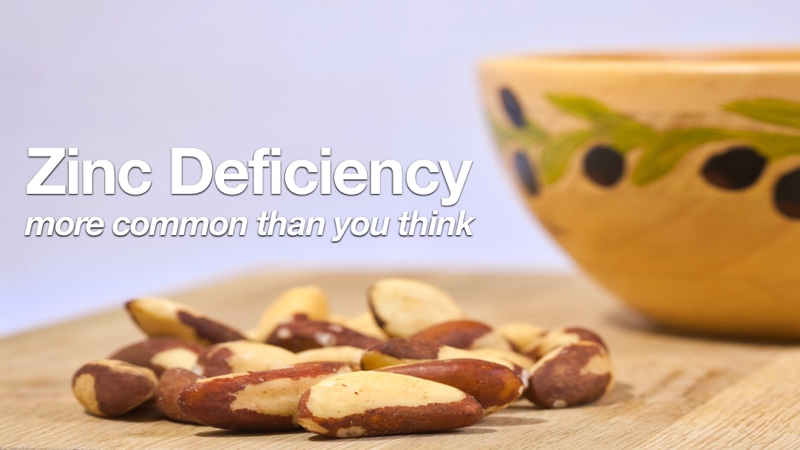You have likely heard about the dangers of calcium or even magnesium deficiency, but zinc deficiency not so much.
This leads many people to believe that zinc deficiency is either not that common or not that important to worry about; but, nothing could be further from the truth!
Zinc deficiency is indeed something you should be concerned about especially if your body is already showing some warning signs of the condition.
Zinc Deficiency Warning Signs to Look For:
- Changes in Hair Growth
As you age, it is normal to experience changes in your hair growth. However, rapidly thinning hair or even hair loss can indicate something more serious, like zinc deficiency. Zinc is a mineral necessary for healthy hair growth, so hair loss often reveals an underlying depletion of zinc.
- Poor Skin Health
Zinc also supports skin health, so without it you may suffer from inflammatory skin conditions such as acne, dermatitis, eczema, psoriasis, or sores or wounds that simply will not heal. Though, keep in mind that these conditions do not necessarily have to be on your face. These conditions may arise in places like your scalp, elbows, hands, or feet.
- Weak Immunity
From the common cold to more serious illnesses, like autoimmune disease, individuals who always seem to be sick are referred to as immune compromised. While many factors can cause weakened immunity, zinc deficiency is commonly involved because your body needs zinc to adequately fight off infection.
- Digestive Issues
Issues in your gut are often reflected in your immunity. Thus, digestive issues like gas, bloating, diarrhea, inflammatory bowel disease, and Leaky Gut Syndrome can all affect your body’s ability to absorb nutrients, like zinc. And that ever-increasing zinc deficiency will only make your digestive health and immunity worse.
- Poor Memory or Cognition
Zinc is necessary for brain cell communication in processes such as learning, cognition, and recalling information. So, if your memory seems to be failing you lately or if your thinking process just feels “foggy,” you may want to get tested for zinc deficiency.
- Loss of Smell and Taste
Loss of smell and taste is a classic sign of zinc deficiency. Zinc is required for both the development and maintenance of taste buds and important salivary enzymes. Children who are fussy eaters are often zinc deficient and once zinc is supplemented they become more open to eating a range of foods.
Zinc Testing and Diagnosis
Your doctor can test you for zinc deficiency by checking your blood plasma and urine or running an analysis of a strand of your hand. Any of these samples can provide an indication of the overall zinc content in your body. Likewise, if your zinc level is low, your doctor can determine whether your deficiency is due to your zinc intake or your body’s ability to absorb zinc.
Who is at-risk for Zinc Deficiency?
Unfortunately, while zinc deficiency is common, certain people are at a higher risk of developing the deficiency. Such individuals more likely to suffer from zinc deficiency are:
- Elderly
The risk for mineral deficiency increases as you age, so zinc deficiency can be common in this population.
- Pregnant or nursing
‘Eating for two’ also means your nutrients are depleted twice as fast and this goes for zinc too!
- Under emotional or physical stress
Stress damages every part of the body, thus your body utilises zinc at a faster-than-normal rate thereby pushing you toward deficiency.
What to do for Zinc Deficiency…
As is often the case, you can reverse zinc deficiency through your diet. Consider consuming more of these zinc-rich foods:
- all-natural chicken
- grass-fed beef
- salmon
- oysters
- pumpkin seeds
- chia seeds
- flaxseeds
- watermelon seeds
- green peas
- asparagus
- spinach
- sprouted nuts (almonds, brazil, cashews)
- dark chocolate
Likewise, probiotic foods, like kefir and fermented vegetables, naturally heal your gut making it easier for you to absorb zinc.
These small changes in your diet can lead to big improvements in your zinc absorption, hair and skin health, immunity, and digestion.
References
Jockers, D. (n.d.). 15 Zinc deficiency symptoms and best food sources. Retrieved from http://drjockers.com/15-zinc-deficiency-symptoms-and-best-food-sources/
Axe, J. (2015, February). Warning signs that you’re zinc deficient [Video file]. Retrieved from https://www.youtube.com/watch?v=eBS2joIc0lA
Phillip, J. (2011, September). Zinc found critical within the brain to improve memory and cognition. Retrieved from https://www.naturalnews.com/033722_zinc_memory.html
Watson, K. & Sullivan, D. (2017, June). Zinc deficiency. Retrieved from https://www.healthline.com/health/zinc-deficiency#symptoms2
Yagi, T. (2013, January). The role of zinc in the treatment of taste disorders. Retrieved from https://www.researchgate.net/publication/234103575_The_Role_of_Zinc_in_the_Treatment_of_Taste_Disorders
Weaver, L. (October, 2016) Feeding Fussy Children. Retrieved from https://www.drlibby.com/feeding-fussy-children/




